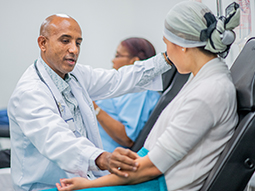The Cancer Fatigue Program at the MedStar Health Cancer Center at Loch Raven Campus brings together multidisciplinary experts to help patients fight cancer-related fatigue by improving their nutrition, physical conditioning, emotional well-being, and more. It brings hope to cancer patients struggling with the disease's most common side effect.
The team includes medical oncologists, dietitians, rehabilitation specialists, mental health professionals, and the hospital's patient resource navigator, a social psychologist and cancer survivor who guides cancer patients through the healthcare system.
"For a long time, the focus in cancer care has been on pain, and we've learned how to treat that in a variety of ways," says Charles Padgett, MD, medical oncologist who helped get the Cancer Fatigue Program started at the hospital. "But often, the more troubling issue is fatigue. And because there are so many possible causes of cancer-related fatigue, managing it effectively has to be a team effort."
Tackling a tough problem
While the exact cause of cancer-related fatigue is unknown, experts say it may be related to the disease itself or its treatment. Fatigue is common with many cancer treatments, such as radiation, chemotherapy, and bone marrow transplant.
"Other issues that often go hand-in-hand with a cancer diagnosis and treatment--anxiety and stress, appetite changes, sleep problems, and a lower activity level--can make the fatigue worse," says Anne Krackow, PhD, patient resource navigator.
The first step in the Cancer Fatigue Program is assessing severity of the fatigue. Patients rate their symptoms and are referred for consultation with other team members.
Many strategies to combat fatigue

Medication can help patients who develop problems such as anemia, vitamin deficiencies, electrolyte and mineral imbalances, and thyroid deficiencies, Dr. Padgett says. Medication can also be used to ease sleep problems, depression, and anxiety, and to enhance alertness and concentration.
Other fatigue-fighting strategies include:
- Mental health counseling. Talking with a trained counselor can help patients manage their emotional needs, including those who are experiencing anxiety or depression.
- Nutrition counseling. Dietitians can design meal plans to help cancer patients maintain good nutrition and a healthy weight, despite a loss of appetite and changes in taste and smell. They can suggest feeding tubes for patients whose treatment may make it hard for them to eat.
- Physical and occupational therapy. Rehabilitation specialists design exercise plans to improve patients' strength, energy and endurance and help them regain daily living skills, such as bathing, dressing, and grooming. They also can help cancer patients organize their day so they save energy for their most important tasks.
"In the past, cancer patients were told by their healthcare providers, 'You're going to feel better when your cancer treatment is over,'" Krackow says. "We tell our patients to use the program to enhance their knowledge about their bodies so that they will make healthy lifestyle choices even before their treatments are completed."
Our providers

Expert oncology care
Getting the care you need starts with seeing one of our oncologists.









